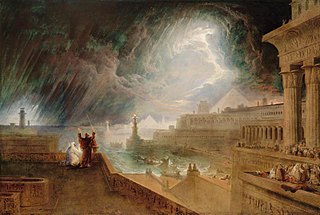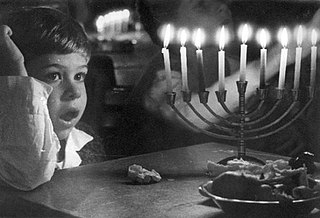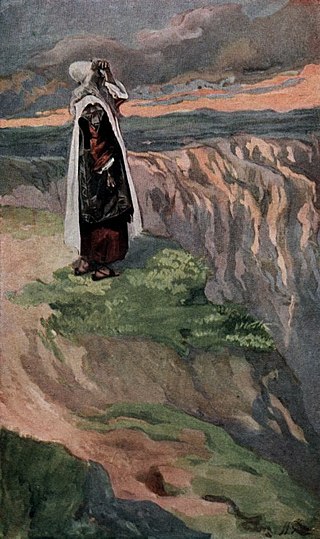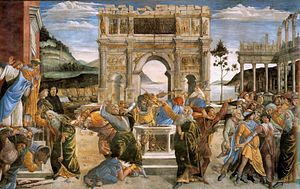
According to Abrahamic religions, Aaron was a prophet, a high priest, and the elder brother of Moses. Information about Aaron comes exclusively from religious texts such as the Hebrew Bible, the New Testament, and the Quran.
Judah ha-Nasi or Judah I, known simply as Rebbi or Rabbi, was a second-century rabbi and chief redactor and editor of the Mishnah. He lived from approximately 135 to 217 CE. He was a key leader of the Jewish community in Roman-occupied Judea after the Bar Kokhba revolt.

Aaron's rod refers to any of the walking sticks carried by Moses' brother, Aaron, in the Torah. The Bible tells how, along with Moses' rod, Aaron's rod was endowed with miraculous power during the Plagues of Egypt that preceded the Exodus. Later, his rod miraculously sprouted blossoms and almonds to symbolize God's choice of Aaron and his tribe for holy service.

According to the Bible, Jochebed was a daughter of Levi and mother of Miriam, Aaron and Moses. She was the wife of Amram, as well as his aunt. No details are given concerning her life. According to Jewish legend, she is buried in the Tomb of the Matriarchs, in Tiberias. In the New Testament, she is praised for her faith in God.
According to the Torah, Izhar was the father of Korah, Nepheg, and Zichri, and was a son of Kohath and grandson of Levi, consequently being the brother of Amram and uncle of Aaron, Miriam, and Moses. No further details of his life are given by the Bible, and according to some biblical scholars the genealogy for Levi's descendants is actually an aetiological myth, reflecting popular perception of the connections between different Levite factions.

According to the Torah, Kehath or Kohath was one of the sons of Levi and the patriarchal founder of the Kehathites, one of the four main divisions of the Levites in biblical times. In some apocryphal texts, such as the Testament of Levi and the Book of Jubilees, Levi's wife, Kehath's mother, is Milkah, a daughter of Aram.

Va'eira, Va'era, or Vaera is the fourteenth weekly Torah portion in the annual Jewish cycle of Torah reading and the second in the Book of Exodus. It constitutes Exodus 6:2–9:35. The parashah tells of the first seven Plagues of Egypt.

Pekudei, Pekude, Pekudey, P'kude, or P'qude is the 23rd weekly Torah portion in the annual Jewish cycle of Torah reading. It is the 11th and last in the Book of Exodus. The parashah tells of the setting up of the Tabernacle.

Dathan was an Israelite mentioned in the Old Testament as a participant of the Exodus.

Shlach, Shelach, Sh'lah, Shlach Lecha, or Sh'lah L'kha is the 37th weekly Torah portion in the annual Jewish cycle of Torah reading and the fourth in the Book of Numbers. Its name comes from the first distinctive words in the parashah, in Numbers 13:2. Shelach is the sixth and lecha is the seventh word in the parashah. The parashah tells the story of the twelve spies sent to assess the promised land, commandments about offerings, the story of the Sabbath violator, and the commandment of the fringes.

Bemidbar, BeMidbar, B'midbar, Bamidbar, or Bamidbor, is the 34th weekly Torah portion in the annual Jewish cycle of Torah reading and the first in the Book of Numbers. The parashah tells of the census and the priests' duties. It constitutes Numbers 1:1–4:20. The parashah is made up of 7,393 Hebrew letters, 1,823 Hebrew words, 159 verses, and 263 lines in a Torah Scroll. Jews generally read it in May or early June.

Naso or Nasso is the 35th weekly Torah portion in the annual Jewish cycle of Torah reading and the second in the Book of Numbers. It constitutes Numbers 4:21–7:89. The parashah addresses priestly duties, camp purification, restitution for wrongs committed, the wife accused of unfaithfulness, the nazirite, the Priestly Blessing, and consecration of the Tabernacle. Naso has the largest number of letters, words, and verses of any of the 54 weekly Torah portions. The parashah is made up of 8,632 Hebrew letters, 2,264 Hebrew words, 176 verses, and 311 lines in a Torah Scroll.

Korach or Korah is the 38th weekly Torah portion in the annual Jewish cycle of Torah reading and the fifth in the Book of Numbers. It tells of Korach's failed attempt to overthrow Moses.

Pinechas, Pinchas, Pinhas, or Pin'has is the 41st weekly Torah portion in the annual Jewish cycle of Torah reading and the eighth in the Book of Numbers. It tells of Phinehas's killing of a couple, ending a plague, and of the daughters of Zelophehad's successful plea for land rights. It constitutes Numbers 25:10–30:1. The parashah is made up of 7,853 Hebrew letters, 1,887 Hebrew words, 168 verses, and 280 lines in a Torah scroll.

Devarim, Dvarim, or Debarim is the 44th weekly Torah portion in the annual Jewish cycle of Torah reading and the first in the Book of Deuteronomy. It comprises Deuteronomy 1:1–3:22. The parashah recounts how Moses appointed chiefs, the episode of the Twelve Spies, encounters with the Edomites and Ammonites, the conquest of Sihon and Og, and the assignment of land for the tribes of Reuben, Gad, and Manasseh.

Allusions in rabbinic literature to the Biblical character Noah, who saved his family and representatives of all the animals from a great flood by constructing an ark, contain various expansions, elaborations and inferences beyond what is presented in the text of the Bible itself.

Discussions in rabbinic literature of the biblical character Moses, who led the Israelites out of Egypt and through their wanderings in the wilderness, contain various expansions, elaborations and inferences beyond what is presented in the text of the Bible itself.

Allusions in Jewish rabbinic literature to the Biblical character Jethro, the father-in-law of Moses, contain various expansions, elaborations and inferences beyond what is presented in the text of the Bible itself.

Allusions in rabbinic literature to the Biblical character Job, the object of sufferings and tribulations in the Book of Job, contain various expansions, elaborations and inferences beyond what is presented in the text of the Bible itself.
According to Judaism, the priestly covenant is the biblical covenant that God gave to Aaron and his descendants, the kohanim. This covenant consisted of their exclusive right to serve in the Temple, and to consume sacrificial offerings and receive other priestly gifts.
















